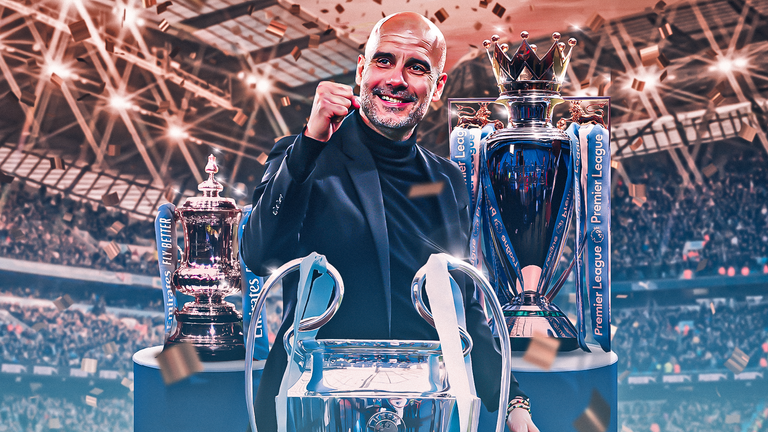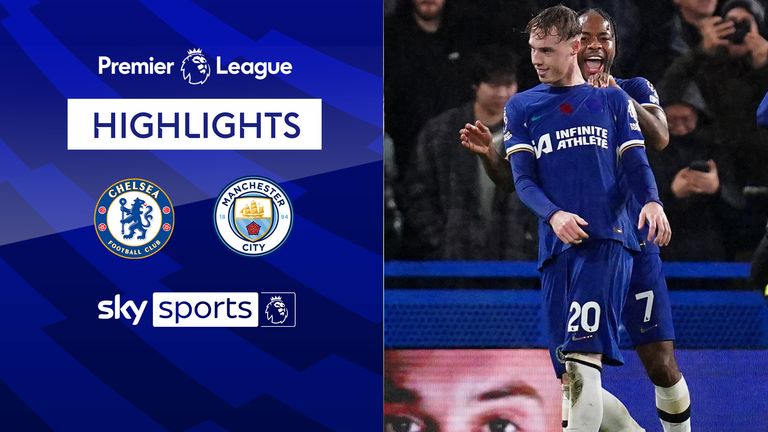Pep Guardiola’s Man City won the treble but he has traded control for chaos in an attempt to stay ahead of the game
City are no longer pressing or keeping possession as they once did as Pep Guardiola embraces Jeremy Doku’s dribbling instead. Will it work? Watch City vs Liverpool live on Sky Sports PL this Saturday; kick-off 12.30pm, with highlights after FT on the SS app & website
Saturday 25 November 2023 13:03, UK
“I wake up today and say Jeremy.” That was Pep Guardiola’s explanation for selecting Jeremy Doku ahead of Jack Grealish at Chelsea. “It is true,” he insisted to Sky Sports before kick-off. But the change at Manchester City is more fundamental than that.
A team that conquered the country and Europe with its strangling possession game has evolved again as Pep Guardiola adjusts to the team's changing personnel and tries to anticipate the new challenges that City will face as they aim to hang on to their title.
Doku's interpretation of that left-wing role is just one example. It is significantly different to the way that Grealish had been coached to play it in the previous two seasons. He is a compulsive dribbler, recently revealing that he dreams about dribbling in his sleep.
So far this Premier League season, he is attempting 8.43 dribbles per 90 minutes, far more than any other player in the competition. The contrast with Grealish - 2.48 attempted dribbles per 90 minutes - is stark. They are performing different functions for the team.
Nothing illustrated that more clearly than Grealish's performance when replacing Doku just before the hour mark at Stamford Bridge. He soon overtook Doku's pass total in the match, attempting nine passes for every dribble instead of Doku's two.
It was Guardiola trying, and ultimately failing, to restore some order to a match that his team struggled to control. That has been Grealish's role at City, even from the flank. A twist on the old-fashioned target man, making the ball stick but from out wide.
Grealish's only Premier League start since August came at Old Trafford, perhaps no coincidence given his manager's tactics there in 2021. "We spoke about them being a transition team," said Guardiola. "We had to put the ball in the fridge." Death by passes.
What has changed? Football, perhaps. Guardiola has always sought control but the rise of man-marking has presented a fresh problem. His positional game risks becoming a little too predictable if City cannot find the spaces. Dribbling helps make the difference.
Speaking to Unai Emery earlier this year, he explained: "Teams are working more than before man-to-man all over the pitch without the ball. You have to adapt. It is not the same to build up against a team playing zonal and against a team playing man-to-man."
Mike Arteta surprised Manchester City with this tactic in an FA Cup tie in January. "I did not expect this approach with this courage, the man-for-man, when this happens it makes the process difficult," said Guardiola. It is not the sort of thing that he forgets.
That may have shaped his squad-building in the summer. Mindful of the need for players who could carry the ball beyond their immediate opponent, it was not just Doku who arrived at Manchester City with this characteristic. He wanted runners in midfield too.
Rodri attempt more carries per 90 minutes than any other central midfielder in the Premier League last season but the next man on that list was Mateo Kovacic of Chelsea. At the age of 29, outside the profile of a typical City signing, Guardiola wanted him, nevertheless.
Wolves' Matheus Nunes had attempted the most dribbles of anyone in the competition during the first three weeks of the season. His time at Molineux had been no more than a qualified success but Guardiola was happy for the club to spend £53m on him.
The result is that, on average, City are carrying the ball 123.3 times per 90 minutes this season - a carry being defined as a player travelling 10 metres or more in possession of the ball. No other team in the Premier League does this even 100 times per 90 minutes.
This is a mini-evolution for a coach long committed the principle that the ball can move faster than any player. That principle remain intact. He wants his teams to have the ball. But there has always been nuance to his approach. His ideas have shifted with time.
Guardiola always resisted the notion that City were broadly similar to his Barcelona team. He highlighted Kevin De Bruyne as a very different profile of midfielder, more dynamic, more direct, more physical, a player for the transition who necessitated a new plan.
But that was minor compared to the change sparked by the signing of Erling Haaland. The striker arrived after City had won the Premier League title pretty much without one. It marked the high point for their possession game - registering 68 per cent of the ball.
City became a different team with Haaland. A penalty-box presence barely involved in the build-up, they were effectively playing with 10 rather than 11 until the final touch. It brought the biggest percentage-point dip in possession of Guardiola's coaching career.
What is interesting is that so far this season those possession stats have dropped by almost as much again. It is a product of Doku being preferred to Grealish on the left but also comes as a result of Julian Alvarez's inclusion in place of the injured De Bruyne.
The two have different skillsets but do occupy similar positions - as evidenced by Alvarez being used to deputise for De Bruyne in that right half-space last season. The pair have started only five Premier League games out of 50 together since Alvarez arrived.
Argentina's World Cup winner has excelled in De Bruyne's absence but the statistics highlight the difference. Alvarez scores more, De Bruyne passes and creates more. It represents a further stylistic shift away from control and towards a more transitional game.
Guardiola is constantly searching for that balance and perhaps this change is all linked to those at the back. His decision midway through last season to bring in more players who, as he put it, enjoyed defending, was integral to their treble success.
But the loss of Oleksandr Zinchenko and then Joao Cancelo, arguably City's most creative player from deep, made it more important to have a fantasy element at the top end of the pitch.
"Jeremy is special in the final third," said Guardiola.
- Stream Man City vs Liverpool on NOW
- Live Premier League table | Fixtures | Results
- Watch free Premier League highlights
- Get Sky Sports | Download the Sky Sports App
A new City has emerged, one more split than before between natural defenders and attackers. That is making them a different proposition without the ball too. Winning the ball back quickly was once a hallmark of a Guardiola team. That is no longer so obvious.
Their PPDA - the passes allowed per defensive action - was the lowest in the Premier League during each of their first two title wins under Guardiola. This season, they have dropped into the bottom half of the table for PPDA for the first time in his reign.
Opta's advanced metrics also track the amount of progress up the pitch that teams make against City per passing sequence. That was often the lowest in the Premier League but is currently at its highest level in the past seven seasons - in other words, since records began.
Will any of this worry Guardiola? Maybe not. In the absence of Rodri, he did attempt to play a more controlled game against Arsenal recently, leaving Doku out, but City appeared far too passive and ultimately paid the price for that by conceding a late winner.
With the pressing and the possession numbers down, the characteristics of his best players having changed, and the nature of the Premier League challenge having changed, perhaps Guardiola is ready to embrace the chaos and back his team in a transition game.
It brought only one point at Chelsea but with 28 of them already this season, Manchester City still top the Premier League table after 12 games. Just do not believe him if he claims that this is more of the same. Pep Guardiola did not just wake up and say Jeremy.






